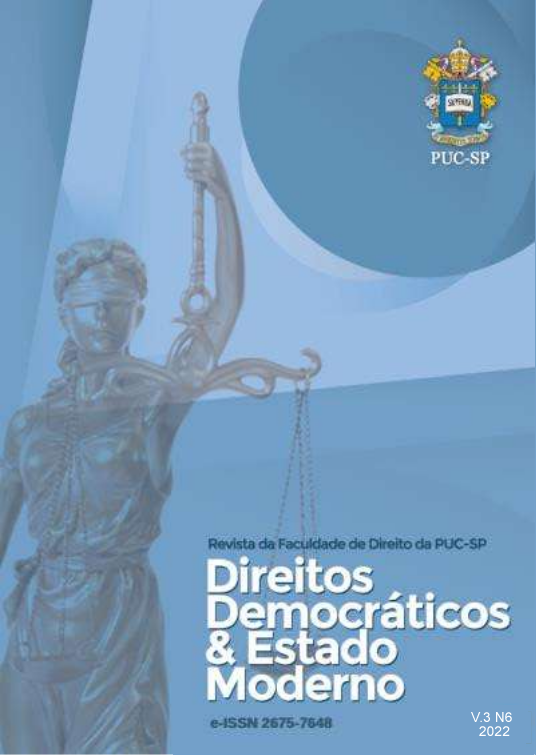Access to justice in the Brazilian Federal Constitution of 1988
DOI:
https://doi.org/10.23925/ddem.v.3.n.6.59904Keywords:
Human rights, Social rights, Judicialization of conflicts, Access to justice, DemocracyAbstract
The present article purpose is substantiate the pressing need on democratic societies for an existence of public institutions such as Public Defender's and Prosecutor´s Office that intend to affirm their role in realizing the ideals of social justice inherent to the democratic system. It starts from multidisciplinary concept regarding to the term poverty, which culminates in the characterization from deprivation of rights and, therefore, as one of the causes of social exclusion, based on human rights precepts and their lack of effectiveness in growing societies. Subsequently, based on the human right of access to justice, the indispensability of public institutions on fulfillment of procedural representation in relation to the less favored and vulnerable social groups are going to be outlined. Also, it is intended to know and explore possibilities implementations` of public policy benefits social inclusion of marginalized members` society by broadening the ways of resolving conflicts as well as demonstrates that this Power, through its institutions realize the individual or collective human and fundamental citizen rights` guaranteed in the Brazilian Constitution of 1988. The principle of access to justice and Constitutional Amendment 45/2004, which introduced changes in the Brazilian judicial system, they serve as a mechanism and support to implement public policies for access to justice by way of the Judiciary Power. This study will use the deductive method to explore bibliographic research from laws, norms, doctrines, jurisprudence and published data related to the subject, in order to analyze the importance of Access to Justice in a democratic society construction.
References
ANDRADE, José Carlos Vieira de. Os Direitos Fundamentais na Constituição Portuguesa de 1976. Coimbra: Almedina, 1987.
ARANTES, Rogério Bastos. Direito e Política: O Ministério Público e a defesa dos direitos coletivos. Rev. bras. Ci. Soc. [online], vol. 14, n. 39, 1999. Disponível no site (www.scielo.br/pdf/rbcsoc/v14n39/1723.pdf).
ARRETCHE, Marta T. S. Tendências no estudo sobre avaliação. In: RICO, Elizabeth M. (Org.). Avaliação de políticas sociais: uma questão em debate. São Paulo: Cortez, 2009.
BARROSO, Luís Roberto. Constituição, democracia e supremacia judicial: direito e política no Brasil con¬temporâneo. Revista Jurídica da Presidência, Brasília, v. 12, n. 96, fev./maio 2010.
BARROSO, Luís Roberto. Judicialização, ativismo judicial e legitimidade democrática, 2012. Disponível em: (http://www.oab.org.br/editora/revista/users/revista/1235066670174218181901.pdf).
BOBBIO, Norberto. Estado, governo, sociedade: para uma teoria geral da política. Tradução Marco Aurélio Nogueira. 4 ed. São Paulo: Paz e Terra, 1986.
CAPPELLETTI, Mauro; GARTH, Bryant. Acesso à justiça. Porto Alegre: Sérgio Antônio Fabris, 1988.
CARVALHO, Leandro Couto; CORREIA, Italo Schelive RODRIGUES, Deivison de Castro. A assistência judiciária integral e gratuita e o papel do advogado nas questões de pro bono. Revista Direitos Democráticos & Estado Moderno. São Paulo: Edição n. 1, p. 133-156, 2020. Disponível em <https://revistas.pucsp.br/index.php/DDEM/article/view/49912/33501>.
DE LA PAZ, Gabriel. Citizenship Identity and Social Inequality. In: Instituto Federal Electoral, San Diego: Center for Civic Education, Califórnia, 2004.
DINAMARCO, Cândido Rangel. A instrumentalidade do processo. 12. ed. São Paulo: Malheiros, 2005.
FERRAZ JÚNIOR, Tércio Sampaio. O Judiciário frente à divisão de poderes: um princípio em decadência? Revista USP, São Paulo, n. 21, 1994.
FERREIRA, Olavo Augusto Vianna Alves; FILHO, Ronaldo Fenelon Santos; NETTO, Carlos Eduardo Montes. A cláusula compromissória como instrumento adequado de acesso à justiça no pós-pandemia. Revista Direitos Democráticos & Estado Moderno. São Paulo: Edição n. 3, 2021, páginas 13 a 33. Disponível em <https://revistas.pucsp.br/index.php/DDEM/article/view/53797/38448>.
GOMES, Luiz Flávio; PIOVESAN, Flávia (Coordenadores). O Sistema Interamericano de Proteção dos Direitos Humanos e o Direito Brasileiro. São Paulo: Ed. Revista dos Tribunais, 2000.
JELIN, Elizabeth; HERSHBERG, Eric. Human Rights and the construction of democracy. In: JELIN, Elizabeth e HERSHBERG, Eric (Org). Constructing Democracy: Human Rights, Citizenship and Society in Latin America. Boulder, Colorado: Westview Press, 1996.
MARSHALL, Thomas. H. Citizenship and Social Class. In: Marshall, T. H. Citizenship and Social Development. Nova York: Garden City, 1967.
O’DONNELL, Guillermo. Notas sobre la Democracia en América Latina. Informe La Democracia en América Latina – Anexo 2: El Debate Conceptual sobre la Democracia en América Latina. 2004. Disponível em: http://democracia.undp.org.
RAWLS, John. Uma teoria da justiça. Tradução de Almiro Piseta e Lenita Maria Rímoli Esteves. 2ª ed. São Paulo: Martins Fontes, 2002.
SANTOS, Boaventura de Sousa. O acesso ao direito e à justiça: um direito fundamental em questão. Coimbra: Observatório Permanente da Justiça Portuguesa, Centro de Estudos Sociais, Faculdade de Economia, Universidade de Coimbra, 2002.
SANTOS, Boaventura. Pela Mão de Alice. Rio de Janeiro: Cortez, 1996.
SCHUMPETER, Joseph. Capitalismo, socialismo e democracia. São Paulo: EDUSP, 1983.
REIF, Linda C. Building democratic institutions: The role of National Human Rights Institutions in good governance and human rights protection. Harvard Human Rights Journal, [S.l.], v. 13, 2000.
TORRES, Ricardo Lobo. O direito ao mínimo existencial. Rio de Janeiro: Renovar, 2009.
VIANNA, Luís Werneck. Democracia e acesso à justiça. In: Seminários Friedrich Naumann. Iuperj, n. 5, 1997
WATANABE, Kazuo. Novas atribuições do Judiciário: necessidade de sua percepção e reformulação da mentalidade. In: Revista Escola Paulista de Magistratura I, n. 1, set/dez, 1996.
Downloads
Published
How to Cite
Issue
Section
License
Copyright (c) 2022 Democratic Rights & Modern State

This work is licensed under a Creative Commons Attribution 4.0 International License.
This work is licensed under a License Creative Commons Atribuição 4.0 Internacional.
The authors grant the journal all copyrights relating to the published works. The concepts issued in signed articles are the absolute and exclusive responsibility of their authors.
DD&EM Magazine - ISSN 2675-7648

















